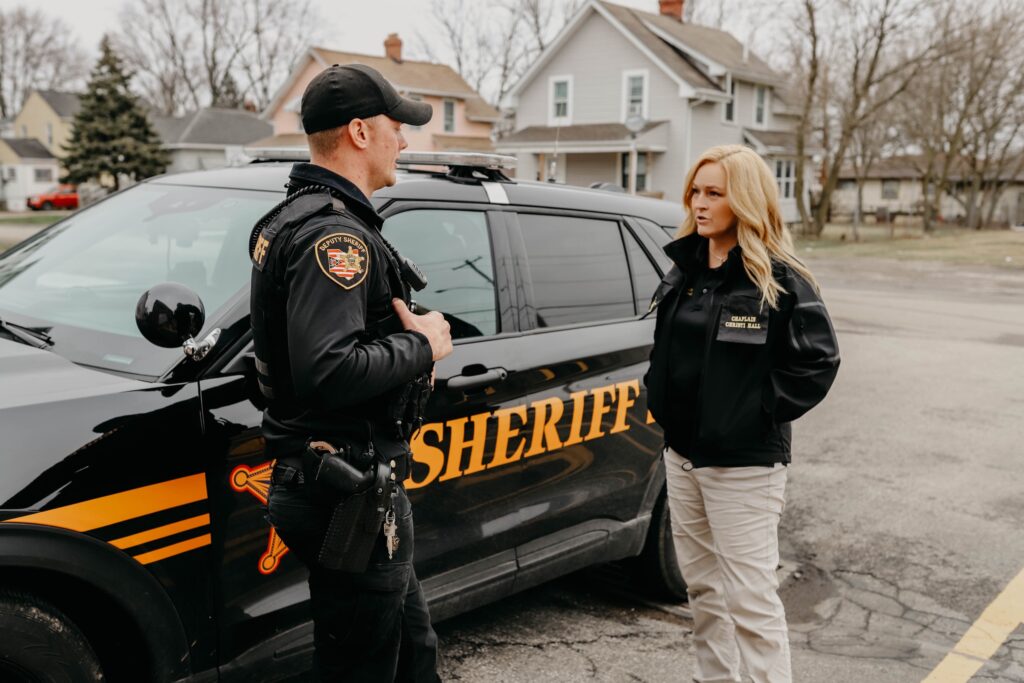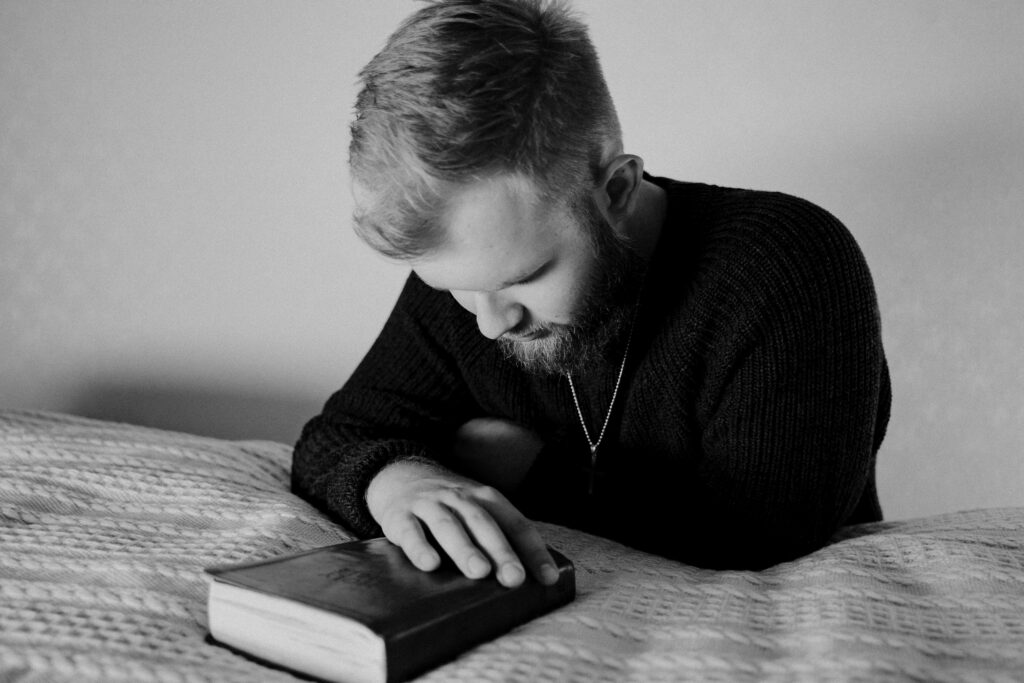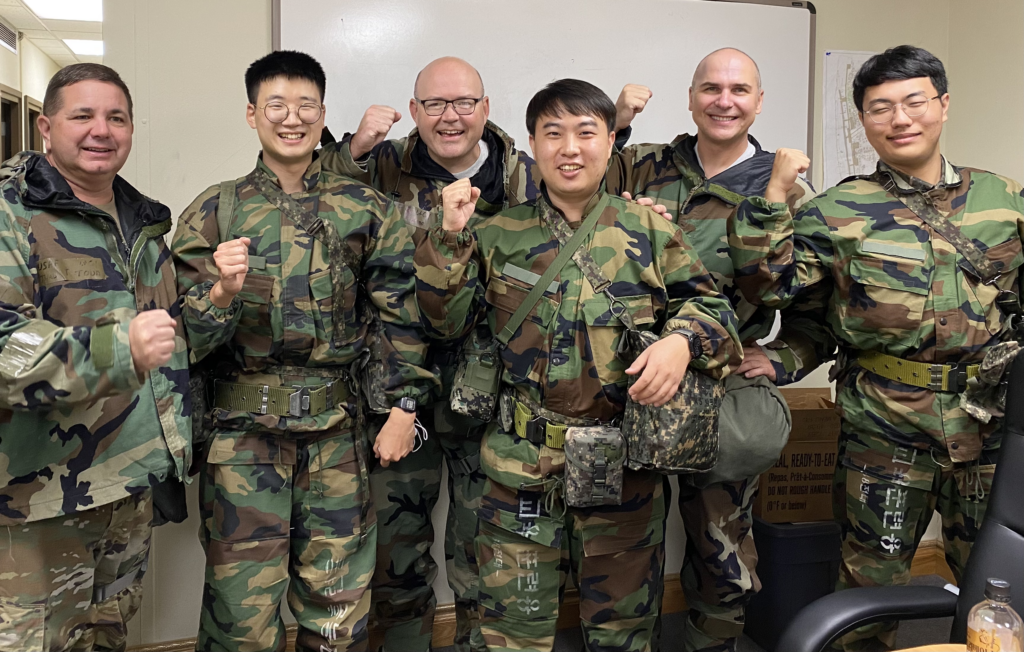Christi Hall sees a mission field where most of us see only a profession. As an endorsed chaplain by the Southern Baptist Convention (SBC) to Ohio law enforcement, she enters an unreached people group daily. Hall understands the culture and speaks the language unique to the police officers she serves. Her path to minister to the brokenness and trauma she’s witnessed in this mission field wasn’t one she planned or imagined, but one that God prepared in advance for her to walk in.
Call to Service
Hall grew up in a small town north of Cincinnati. She comes from a heritage of faith and service; her grandfather preached, her father served in politics, and her mother regularly exercised the gift of hospitality.
“I had the awareness of religion around me, but I didn’t become a Christian until I was 30 because I didn’t understand what Jesus had done for me and how the gospel impacts my life.”
This encounter with Jesus transformed her and gave her purpose. Hall found her calling in a disaster relief setting. Hall says she heard the Holy Spirit whisper, “This is what I created you for: to bring My hope to people who are hurting.”
That moment sparked a journey into volunteer disaster relief chaplaincy with a large organization. Eventually, her compassion for first responders, and her proximity to it—her husband is a firefighter and EMT—opened the door to something more: law enforcement chaplaincy. The invitation came during a training for a newly developed law enforcement chaplaincy program. A Franklin County Sheriff’s Office chaplain approached Hall, saying, “We don’t have a female chaplain. Would you be interested?” Hall said yes.
She became the first female chaplain in Franklin County’s Sheriff’s Chaplain Unit, and later, its assistant director. Today, she serves on the chaplain unit for the department, which consists of 12 chaplains who minister to 980 deputies and 1,500 civilian staff. She also ministers to a smaller city police department nearby and even founded her own national law enforcement ministry, Chaplains and Heroes, which provides emotional and spiritual resources to law enforcement officers and their families. It also equips the local church to serve them. When she became the assistant director of her chaplain unit, she discovered the need for biblically based resources for law enforcement as well as training resources for chaplains called to the field. It was through this that God led her to establish this much-needed ministry.
“God made it clear that this is what I was made to do,” Hall says.
A Day in the Life
Chaplaincy is Hall’s life mission and work, and she’s in this as a volunteer, on-call 24/7 role for the long haul.
“The old model of chaplaincy meant chaplains only showed up when something tragic occurred, such as a critical incident. I do that, but that’s not the heart of my work.” My training is in modern first-responder chaplaincy — a consistent relationship-building, trauma-informed front-line ministry.
Hall does this by providing ministry of presence to officers’ ongoing life issues, resources, and addressing spiritual and emotional needs. To do this well, she must first establish trust.
“It can take eighteen months to three years for a chaplain who makes weekly rounds to build trust and have a meaningful conversation in a large department like mine,” says Hall. “It’s a long-term game.”
She consistently visits deputies each week on all three shifts where she is assigned and chats with them about everyday life. All chaplains in her unit make regular rounds in the agency departments where they are assigned. For four years, Christi was assigned to serve jail deputies.
In the beginning, she utilized what came most naturally to her: baking. “In my first six months as a chaplain, I did things other chaplains wouldn’t even think of; I brought cookies and treats, just like you do for your church volunteers. I just did what I knew, and it worked.”
Once Hall establishes trust, she utilizes her training to care for officers when there is a critical incident or when they open up for a personal conversation. Becoming a chaplain to law enforcement requires specialized training, not only in trauma care but also in areas such as suicide, grief, emotional trauma, and understanding law enforcement culture — equipping chaplains to address the wide range of challenges officers face. She emphasizes the significant physical and emotional strain this line of work puts on officers, who must remain constantly hypervigilant to potential danger around them.
She sees officers’ tendency to compartmentalize their feelings, power through the job, and leave the emotional toll they’re suffering unaddressed; indeed, many do not even realize the emotional toll that happens. Hall educates cadets at the training academy before they even start their careers on the need for resiliency, not just physical, but also in their emotional and spiritual well-being.
She keeps law enforcement Bibles and devotionals on hand, and she maintains a listening ear for those in need. Christi is now assigned as a chaplain at the Detectives Bureau and SIU. The deputies she serves here see the worst of mankind, including child sexual abuse, murder, and human trafficking, every day, all day. They desperately need the peace of Jesus.
Whether speaking at the academy, delivering a death notification, walking the halls of the jail, talking to the deputies’ spouses, on scene with patrol at a critical incident, or speaking with detectives about a recent hard case, Hall is consistently there, and she believes this faithful presence opens doors to share Jesus in a unique way, through the ministry of presence and speaking His truths into their lives when the Holy Spirit leads her to do so.
Challenges and Celebrations
This ministry carries a tremendous burden.
During one tough season of ministry, Hall delivered death notifications to parents whose children died and to children whose parents died in a mass casualty school bus accident that made national news. She served at the reunification center, where she and her team of chaplains checked on the first responders by providing a ministry of presence and practical help, such as water, snacks, pens, and death notifications. They also escorted parents and family members to their children and talked with the children and their parents about the horrific experience of watching classmates die on the bus.
Along with another chaplain in her unit, Christi conducted CISM Debriefings (evidence-based Emotional Debriefs) at the school after being asked to do so by the principal, as they did not have any counselors trained to do such. “We spoke to students on the bus, classmates who watched the action happening live on social media, teachers, and staff. I was also asked (along with another chaplain on my team) to do the CISM Debriefings, along with other trained professionals, to the 70+ first responders that were on scene. By the end of that week, I was struggling due to secondary trauma.”
Hall emphasizes the spiritual maturity required to be a public safety chaplain. She warns that the intensity of her work in helping others process trauma will be too weighty for chaplains who aren’t rooted in Christ and dependent on Him.
“What I do is not easy,” Hall says. “You have to be spiritually mature. You have to plan how you’ll process what you see. Otherwise, it’ll crush you.”
Even in the difficulties, though, Hall finds joy and sees the hand of God at work in the details, lining up people, conversations, and circumstances that could only be from Him. She considers it a great privilege to be used by God in ways that will bear eternal fruit.
“As a new chaplain, I love that God allows me to see Him working.”
Hall recalls when she once entered the jail and was asked who had called her in. A critical incident had just occurred, and a chaplain was needed to talk to deputies who were involved in the incident. No one had called her; the Holy Spirit had prompted her to check on her deputies at that moment. When situations like this occur, Hall is reminded of how the Lord loves the deputies she serves and delights in using her to show them His care.
Once, at a law enforcement marriage retreat where she also serves as a chaplain, three men whose marriages were on the brink of divorce surrendered their lives to Christ and recommitted to their wives.
Hall shared, “They just need someone to show them that Jesus Christ loves them deeply, and He will send them everything they need to get through this career they’ve so bravely chosen. There are not a lot of Christian or biblically grounded resources for law enforcement, so having a marriage retreat that speaks the name of Jesus yet understands what they go through is important to my ministry. It’s a privilege to offer them tools that point them to Jesus.” Hall understands that Jesus is ultimately the one who works to change their lives.
Benefits of SBC Endorsement
Hall takes being an SBC-endorsed chaplain very seriously. It provides her credibility, training, connection, and support.
“You are backed by the full weight of our entire denomination.” Hall also appreciates how the North American Mission Board (NAMB) vets each potential chaplain. There is a legitimacy that one carries as an SBC-endorsed chaplain. When Hall meets other SBC-endorsed chaplains, trust is built in. She knows they are qualified and equipped for the job.
SBC endorsement also provides biblical parameters that align with her conscience. If asked to participate in a particular ministry assignment that falls outside her doctrinal bounds, she’s thankful for the protection her denominational endorsement offers to decline that assignment that violates her theological beliefs as a Southern Baptist.
Hall has also found a family among SBC-endorsed chaplains. “When you go through the endorsement process, you instantly have a family who cares about you and is praying for you.”
Join the Mission
Hall hopes more Southern Baptists will consider becoming chaplains and that more SBC churches will recognize the great spiritual need among law enforcement. More women are also needed. Less than 1% of law enforcement chaplains are female. Officers find a female chaplain’s softness and hospitable, maternal nature trustworthy.
Hall has seen the lasting effect of churches becoming engaged and equipped to serve law enforcement. After building trust with their local departments, Hall received permission for her church to pack and distribute 980 bags of encouragement for first responders, including handwritten thank-you notes, resources, and snacks. In response, one deputy shared with Hall how he was ready to give up, but the care and appreciation he received from these gifts reminded him that what he does for a living matters.
In her appeal to Southern Baptists, Hall offers a caveat. “If you feel a nudge to support law enforcement, learn their language and culture, expect to sacrifice greatly, and prepare to patiently love and serve, as it can take years to see fruit.” She also suggests ensuring your local church is behind you for prayer and financial support when funds are needed.
Whether she’s praying silently over officers in the name of Jesus, offering her presence to a traumatized deputy, or training young cadets, Hall sees the faithfulness of her Savior in every circumstance.
“Law enforcement chaplaincy is extremely hard on many levels, but I’m called to it, and God provides what I need when I need it. He sustains me through my obedience to Him and shows me His Glory over and over, which is why I love this calling.”
____________________________________________________________________________
Learn more about how to become an SBC-endorsed chaplain.
Published September 8, 2025


